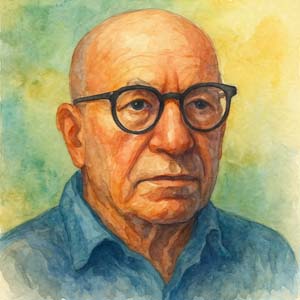 Born on this day in New York City, remarkable social philosopher and writer Eric Hoffer (1902–1983) lost his eyesight at age nine and regained it six years later. He never attended a day of school but was an avid reader, writer, and self-learner.
Born on this day in New York City, remarkable social philosopher and writer Eric Hoffer (1902–1983) lost his eyesight at age nine and regained it six years later. He never attended a day of school but was an avid reader, writer, and self-learner.
"In times of change, learners inherit the earth," he explained. "While the learned find themselves beautifully equipped to work in a world that no longer exists."
Orphaned at age 18, Hoffer moved to Los Angeles "on the bum," lived in skid row, and worked as a lumberjack, dishwasher, factory worker, and migrant farmhand.
To further his education, he borrowed library books and memorized the words of French essayist Michel de Montaigne. Inspired, Hoffer crafted essays of his own. "You learn as much by writing as you do by reading," he said.
In 1942, he was rejected by the military due to a hernia. That year, he moved to San Francisco, California and began a 25-year career as a longshoreman.
"The search for happiness is one of the chief sources of unhappiness," he said.
In 1951, Hoffer published his first book, The True Believer. Written in longhand. the book traced the historical origins of mass movements, from religious wars to German fascism. Scholars loved him. His 1959 follow-up, The Passionate State of Mind, featured 280 philosophical aphorisms.
A singular, self-taught voice, Hoffer reminds us that the life of the mind doesn’t require credentials, just honesty, reflection, and a bit of rugged wisdom.
 Live with compassion.💜
Live with compassion.💜
